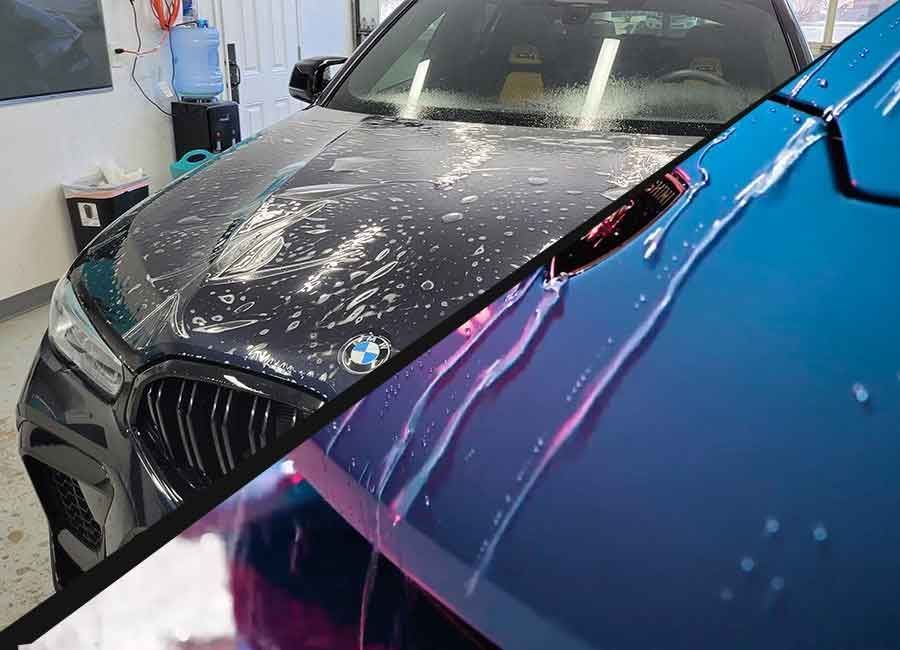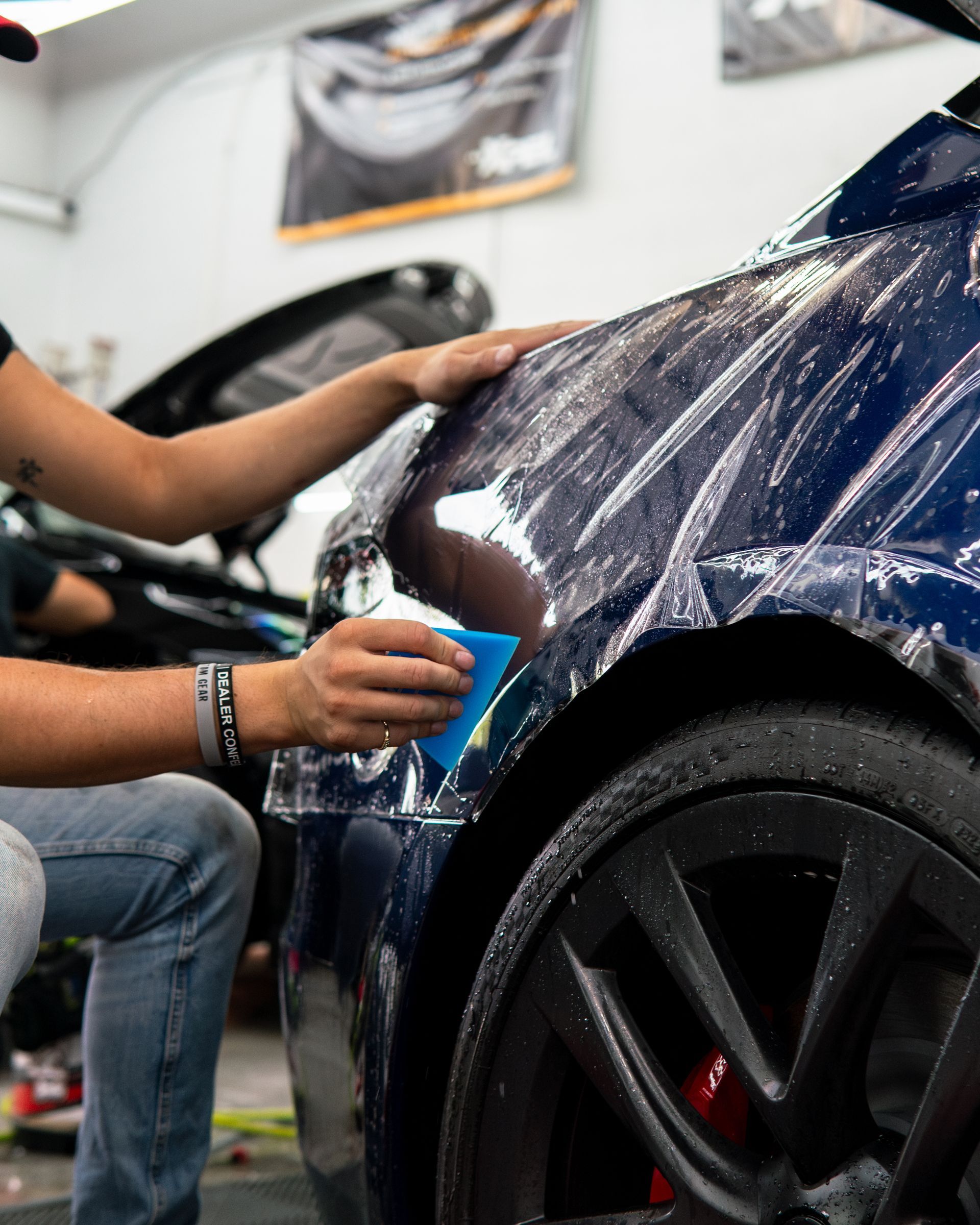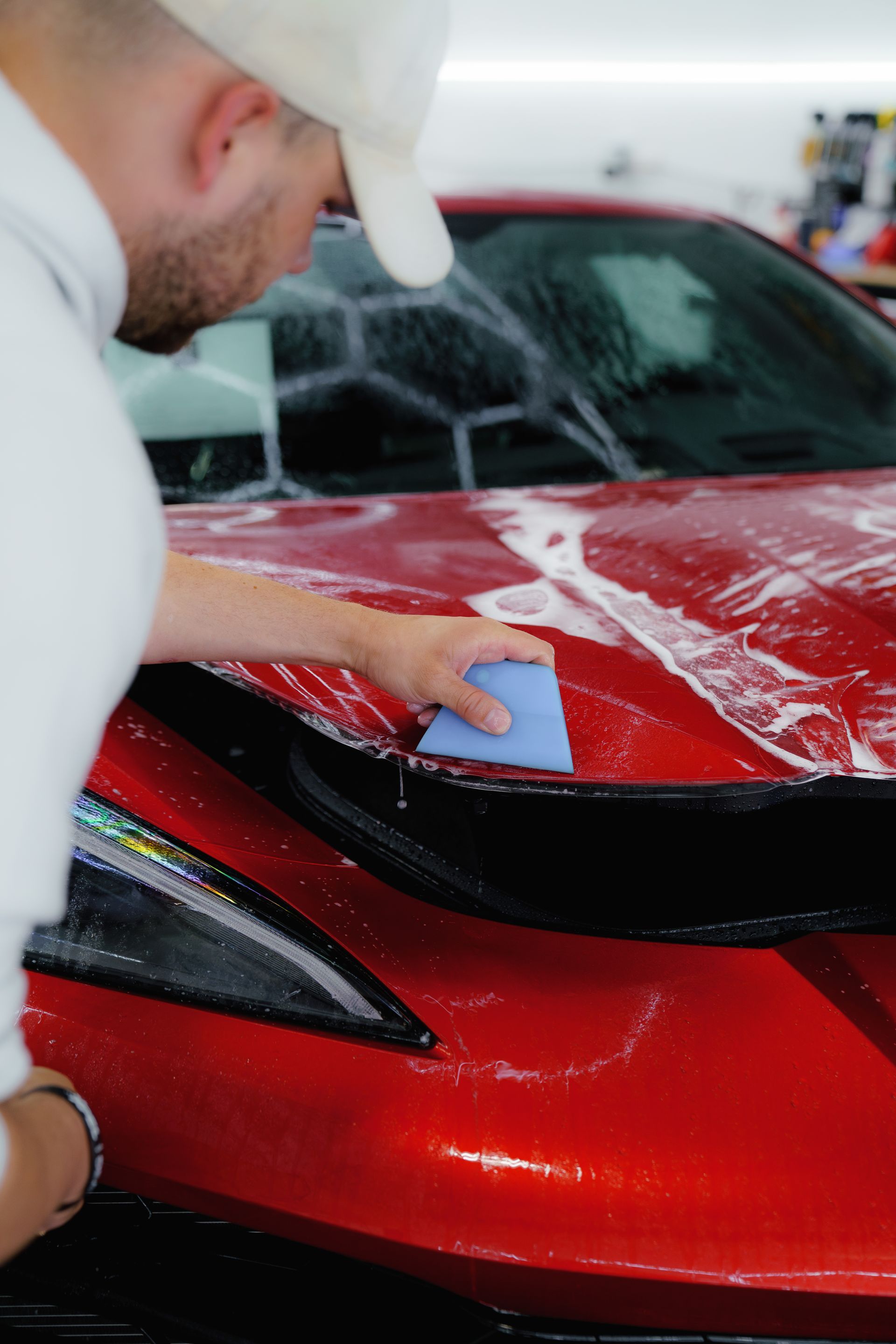Join us on a journey of enlightenment as we delve into the all-out showdown between ceramic coatings and sealants in the arena of car protection. You are cruising along a pristine forest highway, basking in the glistening luster of your newly polished automobile - a veritable chariot, a gleaming beacon among mere motorized contraptions. But then disaster strikes: an unexpected downpour, an unwarranted bird droppings attack, or that innocent parking lot pushcart; each posing potential harm to your vehicle's radiant sheen. This is where our gladiators step into battle, Ceramic Coating and Sealants, their sole purpose - safeguarding your invaluable machine from life's unceremonious antagonists. So buckle up and brace yourself for this in-depth exploration of these two warriors of shine and durability. Welcome to 'Ceramic Coating vs Sealants: What's the Difference?'
Ceramic coatings create a long-lasting, protective layer on your car, providing superior resistance against dirt, grime, UV rays, and some types of physical damage. Sealants, also known as paint protection film or clear bra, generally offer less protection but require less prep work before application and still protect the paint from scratches, road debris, and UV rays. Which option you choose will depend on your needs and budget
Understanding Ceramic Coating
Ceramic coating is a nanotechnology-based method to protect the paint on your car. It provides a transparent and long-lasting protective layer against the elements of nature. The thickness of the layer depends on personal preference but typically ranges from 0.2-0.5 microns. Ceramic coatings are different from traditional wax or sealant applications as they are made up of nano-sized particles that adhere firmly to the car's surface.
Think about ceramic coating as a second skin for your vehicle. Just like our skin has pores, the car's paint pores need protection too. With everyday use, UV rays from the sun, chemicals from the road, dust, and dirt will start to damage the paint job over time. Without protection, these harmful elements can cause oxidation, corrosion, and scratches that are difficult to remove.
Ceramic coatings have superior protective properties compared to wax or sealant applications. They create a robust hydrophobic effect that repels water, mud, and other debris from sticking to the surface, making it easier to clean and maintain the car's appearance. Additionally, ceramic coatings offer better UV protection and chemical resistance than wax or sealants.
On the other hand, some people feel that ceramic coatings can be expensive and challenging to apply correctly without professional help. While there is some truth to this argument, if you take your time and follow the instructions carefully when applying ceramic coatings yourself, you're likely to have an excellent result at a fraction of the cost of hiring a professional detailer.
Understanding more about how ceramic coatings are applied can help with deciding whether it's worth it to do it yourself or if hiring a professional is a more realistic option.
Application Process of Ceramic Coating
Applying ceramic coating is similar in some ways to painting a car. Imagine the process of painting your car, but instead of applying paint to change its color, you're applying a transparent and protective coating over your existing color. Like painting, preparation is essential, and ensuring the surface is clean before any application is crucial.
Before any ceramic coating can be applied, the surface must be free of contaminants like dirt, wax, and oils. The best way to ensure a clean surface is by washing your car with detergent and rinsing it several times until all soap scum has been removed. Then it's imperative to use paint decontamination products such as iron removing sprays or clay bars - these help remove embedded contaminants that might still be lurking on the surface.
When considering ceramic coatings, it's important to note that their long-lasting durability traces back to how well they’re applied. Most ceramic coatings are more challenging to apply than sealants or waxes because they require precise and careful handling due to their nanostructure formula. They dry quickly so that there is little room for any sort of errors during application.
Some argue that if the proper prep isn't performed before the application, there will be problems with adhesion leading to patchy areas over time where the coating has peeled off. While this can happen, following instructions correctly when preparing surfaces for installation could avoid a multitude of issues down the line.
Now we understand ceramic coating's application process; it's time to learn more about sealants' definitions and types.
Defining Sealants
When it comes to paint protection, sealants are among the most popular options in the market. But what exactly are they? In short, a sealant is typically a synthetic product made of polymers and oils that bond with the car's paint to create a protective layer. Unlike wax, which uses natural materials, sealants offer higher durability and longer-lasting protection.
One way to think about the sealant is like a shield for your car. It creates a barrier between your car's surface and external threats such as UV rays, road grime, saltwater corrosion, bird droppings, and pollution. With this protective shield in place, you can maintain your car's original finish for a longer time and minimize the need for more expensive repairs down the line.
For example, suppose you have just purchased a new car and want to keep it looking new for as long as possible. A high-quality polymer or synthetic sealant will provide you with excellent paint protection that can last up to six months or even longer depending on how well you maintain it. By regularly washing your car and reapplying the sealant when necessary, you can keep your vehicle looking showroom-new for years to come.
Moreover, sealants offer several other advantages over traditional waxing. First off, they excel at repelling water and maintaining hydrophobicity on your vehicle's surface. Instead of allowing rainwater or snowflakes to stick onto your vehicle’s surface, it beads up into small round shapes that slide off easily. This also means there will be less dirt buildup after rainfalls or snowstorms which translates into far less time spent on cleaning. Secondly, sealants do not change the appearance of your car's paintwork as some waxes tend to do by adding glossiness/shininess. This can be desirable if you prefer a more natural finish.
Sealants are not the perfect solution, however, as they fall short in certain areas. One drawback is that they do not provide superior protection against heat damage compared to their ceramic coating counterparts which we will discuss below. With the constant sun exposure in hot climates, this can be a concern for some car owners. Additionally, sealants tend to wear off over time and require frequent re-application.
With all of that said, let's delve a bit deeper into the different types of sealants available for you to choose from.
The Different Types of Sealants
When it comes to choosing a sealant product for your vehicle, there are several options to consider. The most common types of automotive sealants include polymer-based and nanoparticle-based products.
Polymer-based sealants consist of synthetic materials that bond with the paintwork to create a protective barrier. They are commonly available at lower price points and are easier to find in stores or online retailers. Polymer-based sealants work by filling in microscopic gaps on the surface of your car's paintwork, creating a smooth finish that makes it difficult for dirt particles and other contaminants to penetrate through.
On the other hand, nanoparticle-based sealants are more advanced than their polymer-based counterparts. They contain tiny particles which bind together to form an ultra-durable coating over your car's surface. One of the main advantages nanoparticle-based sealants have over polymer-based ones is their ability to offer greater UV ray protection and resistance against harsh weather conditions.
To give an example, suppose your car is frequently exposed to strong sunlight; using a nanoparticle-containing sealant will help prevent fading and discoloration of your vehicle’s paint over time.
Of course, with excellence comes hefty price tags. Nanoparticle-based sealants often cost more than polymer-based sealing products due to their advanced technology and added benefits. It is worth considering the climate conditions and level of exposure to harsh elements when deciding which product is most suitable for your vehicle.
Ultimately, choosing the right sealant for your car depends on several factors such as the cost, durability, type of protection you need given the climate, and your level of maintenance. However, regardless of which option you choose, Sealants provide a cheaper option compared to ceramics and offer solid paint protection that can save you time and money in the long run.
Now that we have established a basic understanding of sealants let's move on to comparing their properties versus ceramic coatings.
Comparing Ceramic Coating and Sealants
When it comes to protecting your car's paint, ceramic coating and sealants are two of the most popular options. Both offer great advantages, but there are some key differences between them. In this section, we'll compare ceramic coating and sealants to help you make an informed decision.
The first thing to consider is the durability of each option. Ceramic coatings are known for their longevity, typically lasting up to five years or more with proper care. Sealants, on the other hand, generally last around six months. This significant difference in lifespan has a lot to do with the coatings' formulations. Ceramic coatings create a bond with your vehicle's paint that repels contaminants, while sealants form a protective layer over the paintwork.
To illustrate this point further, imagine spilling coffee on your car. With a ceramic coating, liquid would bead up and roll off effortlessly, making cleanup quick and easy. With a sealant, the coffee might not bead up at all, meaning it could seep into the protection layer and potentially stain or damage your vehicle's paint.
Cost is another factor to consider when comparing ceramic coating and sealants. While ceramic coatings may cost more upfront than sealants due to their superior longevity, they can save you money in the long run by requiring less frequent reapplication. Sealants may be cheaper initially but they require more upkeep.
It's essential to know that both ceramic coatings and sealants must interact differently to ensure their suitable application.
Ceramic coatings require careful preparation before they can be applied properly. The surface of your vehicle must be free from any traces of dirt or oils that can interfere with the bonding of its molecules to car paintwork. Applying it without proper prep work can lead to poor adhesion and even cause problems like high spots or unevenness.
It’s like the process of painting a wall. Prepping the surface before painting, and covering all corners evenly reduce the risk of paint peeling and ensure a long-lasting effect.
In contrast, sealants do not require as much surface preparation allowing for a more straightforward application process.
It's important to note that while ceramic coatings offer significant durability advantages over sealants, they don't provide full protection against rock chips or scratches. They are an extra protective layer on top of your vehicle's existing paintwork. Whereas seals, although offer moderate protection, will have some level of resistance to potential damage caused by various sources including harsh weather elements and environmental pollution.
Furthermore, Ceramic coatings can be difficult to apply correctly and it is a specialist job that requires professional-level knowledge. Although it is possible to apply it yourself, it takes time and patience to get it right. Sealants tend to be less technical when applied as a DIY option but professional applications are also available.
So now you understand the comparison between Ceramic Coating vs Sealant. Let us investigate Protective Properties and Longevity Differences.
Protective Properties and Longevity Differences
Ceramic coatings are often described as a "super coating" offering unparalleled levels of protection from harmful elements including UV rays, pollutants, corrosion, and bird droppings. Its properties make cleaning easier because contaminants will not bond with the surface paintwork which saves time during maintenance.
Imagine how simple your car washing routine could be if raindrops and dirt simply washed away without needing any elbow grease!
Paint sealants are great alternatives for those who desire moderate protection whilst maintaining an aesthetic outlook on their vehicle. Made using polymers and oils, this synthetic form of protection provides a barrier against UV and other contaminants. The sealant offers better protection than waxing or polishing.
While ceramic coatings are known for their absurd durability, it’s important to note that they’re not a miracle solution offering full-proof protection forever. Over time, even the best ceramic coatings may break down due to environmental exposure, normal wear and oxidation.
If your car is frequently exposed to intense sunlight, salt, or high humidity levels(seaside living), the coating may break down faster than average. So always consult with your seller...when to top up or reapply.
Sealants tend to wear off after only a few months, making them more appropriate for seasonal protection, but one effective technique to maintain the vehicle's shine is following proper surface maintenance at regular intervals.
For instance, scheduling a thorough detailing every three months can help maintain your car's paintwork. Detailing includes washing, drying, and other exterior care methods equipped with premium products intended to remove contaminants that keep your car looking fresh and vivid.
It's like preserving your skin during winter periods by exfoliating and moisturizing routinely. You’ll have clearer skin throughout the cold months.
Now, with all this information on Protectives Properties and Longevity Differences, you’re ready to make an informed choice for your unique situation.
Remember that whichever option you choose: Always park in shaded areas to prevent heat damage on your coating; don't forget to remove any bird droppings promptly as they are corrosive; follow recommended maintenance schedules by sellers or professionals; most importantly don't skimp on quality service providers, so future experiences can remain memorable.
Making the Right Choice: Practical Considerations
Now that we've explored the differences between ceramic coatings and sealants, you may be wondering which option is right for you. As with any car care product, the choice ultimately comes down to your personal needs and preferences.
Some practical considerations to keep in mind when deciding between ceramic coatings and sealants include your budget, how much time you're willing to invest in application and maintenance, and the conditions your car will be exposed to on a regular basis.
In terms of cost, sealants are generally more affordable than ceramic coatings. If you're on a tight budget or simply looking for an affordable way to protect your car's paint job, sealants may be the better choice for you. Ceramic coatings can be significantly more expensive and may require a professional application or special equipment, which can add to the overall cost.
Think of getting ceramic coating as getting dental veneers — it's a significant investment that requires proper maintenance but provides long-lasting protection and beautiful results if well taken care of. On the other hand, sealants are like braces — they're less costly and require less maintenance but provide effective protection that lasts for a shorter amount of time.
However, while sealants may be more cost-effective upfront, they don't offer the same level of protection as ceramic coatings do. If your car is frequently exposed to harsh weather conditions, bird droppings, or other environmental factors that can damage its paint job, it may be worth investing in a more durable solution like ceramic coating.
Another factor to consider is the effort required for application and maintenance. Sealants are generally easier to apply than ceramic coatings and require less surface preparation beforehand. They also don't need as much maintenance as ceramic coatings do since they only last for a few months at most. Ceramic coatings, on the other hand, require much more careful application and maintenance to ensure that they remain effective for years to come.
This may be a deciding factor for those who don't have the time or energy to devote to regular car care routines. With sealants, applying a fresh coat every few months is usually sufficient to keep your car protected. However, if you're willing to put in the extra effort upfront, ceramic coatings can offer greater peace of mind that your car's finish is fully protected against any potential harm.
Ultimately, the choice between ceramic coating and sealants depends on a variety of factors unique to your individual situation. By weighing the pros and cons of each option based on your budget, time constraints, and everyday driving conditions, you can make an informed decision about which product is best for you and your vehicle. Whether you opt for the long-lasting protection of ceramic coating or the affordability and ease of use offered by sealants, regular maintenance will always be key to keeping your car looking its best.
Attention, Pennsylvania Vehicle Owners! 🚗
Discover the ultimate solution for your car's protection and shine! Introducing Pennsylvania Vehicle Care and Auto Ceramic Coating at Acap Films – the best ceramic coating installer in town!
🌟 Experience Unparalleled Shine: Our advanced ceramic coating creates a stunning, mirror-like finish that will make heads turn wherever you go. Say goodbye to dull paint and hello to a glossy, showroom-worthy appearance!
🛡️ Ultimate Vehicle Protection: Shield your precious vehicle against harsh elements, UV rays, acid rain, and scratches. Our ceramic coating forms a protective barrier that keeps your car's paint looking pristine and ensures long-lasting durability.
💦 Easy Maintenance, Effortless Cleaning: No more spending hours washing and waxing your car. Our ceramic coating makes maintenance a breeze. Dirt, grime, and contaminants will slide off effortlessly, leaving your car looking effortlessly clean.
🌬️ Weather-Resistant Performance: Pennsylvania's weather can be unpredictable, but our ceramic coating can handle it all. From extreme heat to freezing temperatures, your car's finish will remain resilient and unaffected by the elements.
👨🔧 Expert Installation: Trust your vehicle with our team of skilled professionals who have years of experience in ceramic coating. We take pride in delivering top-notch craftsmanship and attention to detail to ensure a flawless application.
🔒 Long-Term Satisfaction: We stand behind our work and offer a satisfaction guarantee. You can have peace of mind knowing that your car is in the hands of experts who prioritize your complete satisfaction.
📞 Don't wait any longer! Give your vehicle the care it deserves. Contact Acap Films today and discover the unrivaled beauty and protection of the ceramic coating.
☎️ Call us now: (484) 241-2038





